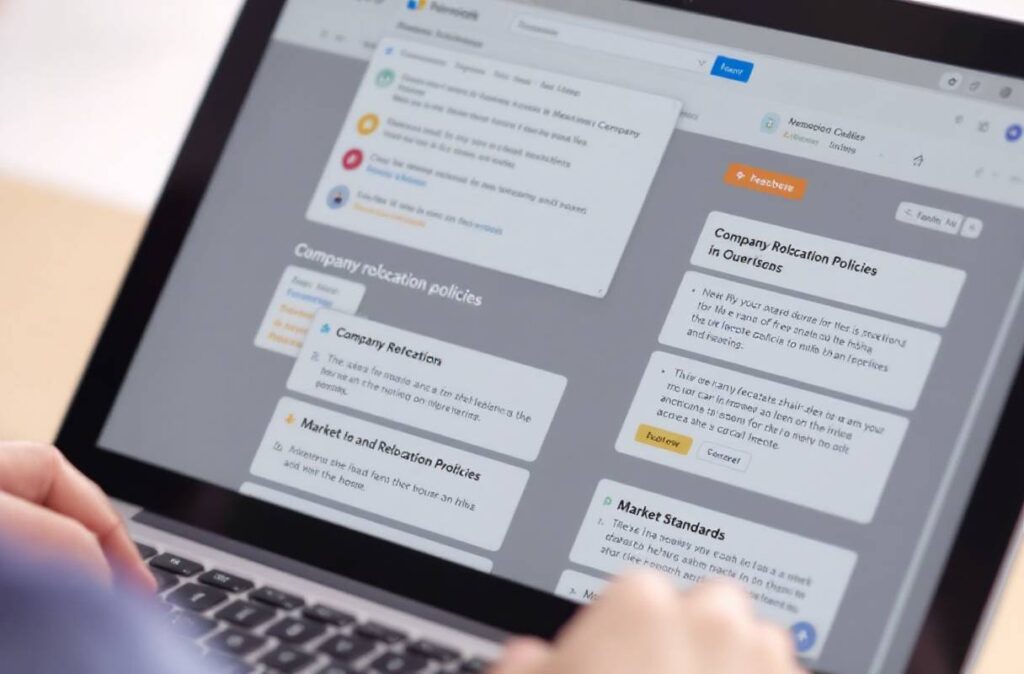Imagine landing your dream job only to find yourself facing the daunting challenge of relocating. The excitement of a new opportunity can quickly be overshadowed by unexpected moving expenses and logistical hurdles.
But fear not! With the right strategies and knowledge, you can navigate job relocation negotiations confidently, ensuring a smooth transition without breaking the bank. Let’s dive into the essential tips that will empower you to secure the best possible relocation package.
Understanding Job Relocation Expenses
So, you’ve got a new gig that’s got you packing. But wait, moving ain’t just about filling boxes; there are plenty of hidden costs that can sneak up on ya. Whether you’re a family with kids in tow, a retiree chasing warmer weather, fresh out of college, or just fleeing the cold, knowing these expenses can save a ton of headaches.
Why Haggling Over Moving Costs Matters
Let’s get real, talking cash isn’t everyone’s cup of tea. But when it comes to moving, a little chit-chat with your new boss about covering costs can make a big difference—not just in your bank balance, but in showing them you’ve got what it takes to tackle any challenge.
Asking for a hand with moving shows you know your worth and can communicate effectively. Plus, it helps make the move more bearable, especially if you’ve got kiddos or need special arrangements. For more keep-calm-and-carry-on tips, check our guide on cross-country move planning.
Usual Suspects: Job Relocation Expenses
When you’re on the moving train, lots of costs jump on board too. Here’s a peek at what you might end up shelling out for:
Moving Costs
From hiring muscle to schlep your stuff to DIY truck rentals, moving costs change with how far you’re going and how much you’re lugging.
| Expense Type | Estimated Price Tag |
|---|---|
| Movers with Muscles | $1,000 – $5,000 |
| DIY Truck Rental | $300 – $2,000 |
| Packing Goodies | $100 – $300 |
Got a long trip? Have a gander at our long-distance moving costs scoop.
Temporary Digs
While you’re hunting for the perfect pad, you might need to crash in hotels or short-term rentals. It can burn a hole in your wallet if you’re not careful.
| Crash Pad Type | Estimated Weekly Bill |
|---|---|
| Hotel Room | $500 – $1,500 |
| Short-term Hideaway | $700 – $2,000 |
Travel Costs
Getting yourself from A to B ain’t cheap. Planes, trains, and automobiles—all come with their own price hike depending on how far you’re going.
| Mode of Transport | Estimated Fare |
|---|---|
| Jet Off | $100 – $1,200 |
| Hit the Road | $200 – $800 |
Stuck on whether to fly or drive? Learn more in our flying vs driving long-distance move breakdown.
Rental Set-up Fees
Renting a new place often means coughing up for deposits and the first month’s rent. It’s a price you gotta pay to snag a new place.
| Fee Type | Estimated Cost |
|---|---|
| Safety Deposit | $500 – $2,000 |
| First Month’s Rent | $1,000 – $3,000 |
Helping Your Spouse Land a Job
If your better half needs to find work after the move, some employers might just offer a hand with that too.
Perks and Nice-to-Haves
Some companies sweeten the deal with extras like help buying a house or language lessons to help you get settled in your new digs. Don’t be shy about asking!
Grasping these costs can make your move smoother and less stressful. Want the full scoop on handling expenses like a pro? Check out our long-distance move budget tips for more handy advice.
Assessing Your Needs

Taking the plunge and moving for a new gig is no small feat—it’s like packing your life into boxes and reinventing yourself, all while juggling the fine art of negotiating how much your employer will chip in for the journey. Your first move is to accurately figure out what you truly need for a smooth ride to your new pad.
Creating a Budget
Budgeting is your best friend when you’re moving. Knocking together a budget lets you get real with the dollars and cents of what’s coming and preps you to huddle with your employer on covering costs. Here’s a breakdown of what you gotta think about:
- Moving Costs
- Temporary Housing
- Travel Expenses
- Rental Assistance
- Storage Costs
- Other Costs
Sample Relocation Budget:
| Expense Category | Estimated Cost ($) |
|---|---|
| Moving Costs | 3,000 |
| Temporary Housing | 1,500 |
| Travel Expenses | 500 |
| Rental Assistance | 2,000 |
| Storage Costs | 300 |
| Miscellaneous Costs | 700 |
| Total | 8,000 |
If you’re hunting for some extra tips on how to nail this budget down, mosey on over to our article on long-distance move budget tips.
Identifying Essential Expenses
Once you’ve got your budget squared away, it’s time to sort the wheat from the chaff. You’re looking for those critical expenses that you can’t dodge if you want to make your move as smooth as butter. Have a glance at these costs you should definitely cover:
- Professional Movers or Moving Services
- Temporary Housing
- Travel Costs for the Family
- Security Deposits for New Digs
- Getting Set Up (think utilities, internet, the works)
Nailing down these must-pay expenses keeps things in focus when you’re chatting with your boss about what they’ll cover. For more on what you really need, check out our piece on long-distance moving costs.
Prioritizing Your Requirements
Getting your priorities straight is key when buttoning up the whole negotiation dance. Not everything might get a stamp of approval, so know what’s essential and what’s just icing on the cake. Hash out those essentials first, and if there’s room, sprinkle in some extras to ease into your new life.
Must-Have vs Nice-to-Have Expenses:
| Expenses | Must-Have | Nice-to-Have |
|---|---|---|
| Moving Costs | ✔ | |
| Temporary Housing | ✔ | |
| Travel Expenses | ✔ | |
| Rental Assistance | ✔ | |
| Spousal Employment Assistance | ✔ | |
| Extra Perks (e.g., gym membership) | ✔ |
Being upfront about what’s on your must-have list ensures you get the basics covered and opens the floor for better negotiating. Looking for more nuggets of wisdom? Don’t miss our guide on cross-country move planning.
By mixing a solid budget, knowing what expenses you can’t do without, and sorting your must-haves from your niceties, you’re in a sweet spot to tackle those job relocation talks with swagger. For even more advice, peek at long-distance move stress management.
Researching Your Options

Thinking about packing up your life and heading somewhere new for a job? Before you start loading boxes into the car, you gotta dig into your options. Make sure you’re getting a deal that doesn’t leave you eating noodles for months.
Company Policies on Relocation
So, what’s your company gonna do to help you with the big move? Understanding what’s on the table is like knowing the rules to Monopoly—can’t play the game if you don’t know what Free Parking’s worth. Most bosses have a playbook of what they’ll cover:
- How much they’ll shell out for moving stuff
- If they’ll put you up in a hotel or Airbnb
- Covering your gas or plane tickets
- Helping your partner find work in the new city
Go through these policies with a fine-tooth comb to see where you might need to push for a little extra help.
Market Standards for Relocation Packages
Alright, what are other companies doing? You don’t want to be the only one bringing a side salad when everyone else has got steak. You need to know the going rate for moving benefits in your field. Here’s a cheat sheet:
| Expense Category | Typical Amount Covered |
|---|---|
| Moving Costs | $5,000 – $10,000 |
| Temporary Housing | $1,000 – $3,000 per month |
| Travel Expenses | $500 – $2,000 |
| Rental Assistance | One month’s rent + deposit |
| Spousal Employment | Career counseling, networking assistance |
Arm yourself with these figures so you can go to bat with your boss knowing what’s fair and what’s a joke.
Gathering Information on Typical Expenses
Next, let’s get into some number crunching. You gotta know what your move’s gonna cost, cold turkey. Think of it like making a grocery list before hitting the store:
- Trucks and movers: Packing up is just stuff, but it ain’t free—gotta get quotes.
- Housing: Will you need to crash somewhere short-term?
- Hitting the road or skies: Tickets, gas, snacks—that stuff adds up.
Here’s a breakdown to make it less of a guessing game:
| Expense Type | Expected Cost |
|---|---|
| Moving Truck Rental | $1,200 – $2,500 |
| Temporary Housing | $1,500 – $3,000 per month |
| Airfare | $300 – $1,000 |
| Car Shipping | $600 – $1,200 |
Having this list is like having cheat codes—use it to score a better package. And if you’re looking to keep some cash in your pocket, check out ways to save on long-distance moves.
In short, doing your homework on your company’s offers, what others are getting, and your actual costs will set you up to ask for what you need—without feeling like Oliver Twist. Want more savvy tips? Dive into long-distance moving costs to get even sharper on your moving game.
Negotiating Strategies
Negotiating job relocation expenses might feel like wrangling a stubborn mule, but with the right game plan, you’ll be wielding your lasso like a pro. Here are some solid tips to help you make a convincing pitch, get your message across, and reach a win-win with your boss.
Making a Compelling Case
To get what you want in negotiations, you’ve got to lay out your cards, showing why your ask is a slam dunk for the company. This means clearly explaining why covering your relocation costs is a smart move for them. Talk up benefits to the company like how you’ll be able to knock it out of the park with better productivity, be closer to important markets, or just have an overall better balance between work and all the other stuff you have going on.
- Dig Into the Numbers: Know your stuff—arm yourself with data on typical relocation expenses from reliable sources. You should know the ins and outs of things like packing up, a temporary crash pad, and how not to go broke on flights.
- Break It Down: Lay out your potential costs in a no-nonsense way. When your numbers are crystal clear, it’s easier for your employer to see why you’re asking for what you’re asking.
| Expense Category | Estimated Cost |
|---|---|
| Moving Costs | $2,000 – $5,000 |
| Temporary Housing | $1,500 – $4,000/month |
| Travel Expenses | $500 – $1,200 |
| Rental Assistance | $1,000 – $3,000 |
| Spousal Employment Assistance | $1,000 – $3,000 |
Want the full scoop? Check out our article on long-distance moving costs for more details.
Communicating Your Needs Effectively
Speaking your truth is everything when you’re negotiating. You’ve gotta keep it real, but also show how your requests fit in with the company’s big picture.
- Keep It Classy: Bring your A-game with a professional approach. Stick to facts and save the tears for happy hour.
- Spin It Positively: Put a sunny spin on your ask. Swap out, “I need this,” with, “This will let me knock it out of the park by…”
- Drop Some Internal Knowledge: Bring up any relevant company rules or past cases that back you up. Toss in mentions of the company’s relocation policies if they’ll help your case.
Peep our guide on communicating effectively during a long-distance move for more savvy tips.
Finding Common Ground with Your Employer
Negotiations are all about finding that middle path. Being flexible can turn the tides towards a deal that’s golden for both you and your employer.
- See It From Their Side: Show you’ve got a handle on the company’s money situation and concerns. Making it clear that you’re thinking about their end shows maturity and can pave the way to an agreement.
- Offer Plan B’s: If your initial ask is giving them heart palpitations, have a backup plan. For instance, if footing the whole bill for your temporary place isn’t an option, suggest splitting costs.
- Keep It Friendly: A little teamwork goes a long way—keep the lines open and work together to brainstorm some killer solutions.
Craving more? Head over to our article on long-distance move budget tips for more crafty advice.
By following these strategies, you ready yourself to tackle the rollercoaster of negotiating job relocation expenses. Remember, the secret sauce is your prep work, speaking up clearly, and playing nice. With these in your toolkit, you’ll walk away with a sweet deal.
Expense Categories to Think About
When hashing out the ins and outs of job relocation, it’s smart to zero in on which expenses might get a nod. Covering all your bases can save you a heap of trouble later.
Moving Costs
Moving costs often sit at the top of the pile in terms of expenses when you’re packing up for a new gig. This might mean shelling out for pros to handle the heavy lifting, renting a truck, or using those handy moving pods. It pays to know the going rates and what your company typically offers to foot—that’ll give you the upper edge in negotiations. Check out our article on cross-country move planning for extra pointers.
| Stuff to Pay For | Usual Cost Bracket |
|---|---|
| The Professional Movers | $2,000 – $5,000 |
| Renting a Moving Truck | $1,000 – $2,500 |
| Oh, Those Moving Pods | $1,500 – $3,000 |
Temporary Housing
Sticking a roof over your head temporarily might mean short-term apartments, hotel rooms, or longer hotel stays till you find a steadier place. Companies might throw in partial or full coverage, usually for the first handful of weeks or months.
| Short-Term Digs | Monthly Price Estimation |
|---|---|
| Short-Term Rentals | $1,000 – $2,500 |
| Crash at a Hotel | $2,000 – $4,000 |
| Extended Hotel Hideout | $1,500 – $3,000 |
Travel Expenses
Let’s face it, traveling costs during your move from A to B can stack up. This includes plane rides, gas, tolls, and even chow money on the go. Ironing this out with your boss can make sure the bills don’t solely land on your plate. For penny-pinching strategies during a long relocation, peep our article on save money long-distance move.
Rental Assistance
If you’re heading somewhere where “home” means “rent,” rental help can come in handy. Services might cover security deposits, first and last month’s rent, and bailing fees from your old digs.
| Help with Rent | Average Cost |
|---|---|
| Security Deposit | $500 – $2,000 |
| First & Last Month’s Rent | Depends on the Area |
Spousal Employment Assistance
Relocating with a significant other? Helping your partner score a gig can be a huge perk. This includes help with job hunts, career counseling, or getting their resume spruced up.
| Help for the Plus-One | Cost Range |
|---|---|
| Job Hunting Boost | $500 – $1,000 |
| Career Advice Sessions | $100 – $300 each |
| Resume Spruce Up | $100 – $500 |
Extra Benefits and Perks
Some companies might sweeten the deal with extras that make moving less of a hassle. Think storage solutions, childcare help, or schooling credits for the kiddos.
| Extra Perks | Likely Cost |
|---|---|
| Storage Solutions | $50 – $200/month |
| Childcare Aid | Costs Vary |
| School Fees Coverage | Depends on the Educator |
Staying clued-up on these categories of expenses can calm the jitters of negotiating your job move. By being thorough, you can make the transition smoother. For even more tips and advice, check out our reads on long-distance moving costs, long-distance moving insurance, and other helpful info.
Documenting Agreements
Getting everything squared away on paper when you’re negotiating is a must. It makes sure everyone knows what’s going on and locks in the rules of the game. It also means fewer mix-ups later, and you’ve got something to point to if there’s any confusion with your employer.
Getting Everything in Writing
Every little detail of your job relocation deal needs to be in writing—no exceptions. Whatever was said during chit-chat, make sure it lands on paper too. This should include specifics like what costs are covered, how to claim any paybacks, and any extras you’ve got coming your way.
Reviewing and Clarifying Terms
Before you put your John Hancock on that agreement, take a good, hard look at the terms. Grasp every nook and cranny of what’s in and what’s out. If there’s anything that gives you pause, ask for clarity. Avoiding head-scratchers now saves headaches later. It’s wise to let a savvy friend or a legal eagle give it a once-over too.
Retaining Records for Future Reference
Hang on to all the paperwork related to your move—it’s your safety net. Keep the original deal, any back-and-forth chat logs, receipts, and every piece of paper that matters. Tidy records make it easier to watch over your costs and claims, and they’re gold if any roadblocks pop up.
| Document Type | Purpose |
|---|---|
| Initial Agreement | Spells out the signed, sealed, and delivered terms for the move |
| Communication Records | Captures the back-and-forth on all the relocation details |
| Receipts | Confirms the out-of-pocket expenses you face during the move |
| Review Documents | Double-checks everything’s shipshape legally and clearly |
Looking for more wisdom on moving across country lines? Check out our tips on cross-country move planning and our long-distance moving checklist. For strategies on penny-pinching during your move, see save money long-distance move.
Post-Negotiation Tips
You battered a solid deal on your job relocation expenses! Now let’s make sure you’re following through on all those sweet terms and conditions. Here’s how you can keep things ticking like a well-oiled machine.
Following Up on Agreed Terms
Now that the deal is set, don’t let those details slip through the cracks. Double-check that everything your boss promised is officially written down and signed off. This means nailing down stuff like reimbursement amounts, deadlines, and any little quirks in the relocation package.
| Type of Expense | Amount Promised | Reimbursement Deadline |
|---|---|---|
| Moving Costs | $3,000 | 30 days after move |
| Temporary Housing | $2,500 | 15 days after move |
| Travel Expenses | $1,000 | When receipts are handed in |
| Rental Help | $1,200 | 1st month after moving |
| Help for Spouse’s Job Hunt | $800 | When receipts are handed in |
Need more tricks for cutting moving costs? Check out our long-distance moving costs guide.
Keeping Open Communication
Let’s talk good ol’ communication. Keeping the convo going with your employer about your move progress is like your relocation secret weapon. Let them know what’s up—whether it’s a delay or a hiccup—and be quick about flagging down anything that needs more fixing.
If you hit any bumps or need extra help, give your HR team a heads-up pronto. Being on top of communication not only scores you points for showing responsibility but also makes those bumps in the road easier to iron out.
Expressing Gratitude for Support
Cap it off with a proper thank you! A note, an email, or even a quick chat to say thanks for the support can go a long way. Let your employer know their help made a world of difference in your move.
Ready to conquer your move? We’ve got handy guides and tricks to keep you on track: cross-country move planning, long-distance moving checklist, and long-distance move stress management. Dive in to stay organized and stress-free during your move.
Conclusion
Relocating for a new job is a significant life change, but with thorough preparation and strategic negotiation, you can turn potential stress into a manageable and even rewarding experience.
By understanding your relocation expenses, creating a solid budget, researching your options, and communicating effectively with your employer, you set yourself up for a successful transition.
Remember to document all agreements and keep the lines of communication open to ensure everything goes smoothly. Armed with these tips, you can confidently navigate the complexities of job relocation, making your move not just a necessity, but a well-planned step towards your career growth and personal happiness.
FAQs
What are the common expenses covered in a job relocation package?
Common expenses include moving costs, temporary housing, travel expenses, rental assistance, and sometimes spousal employment assistance.
How can I create an effective relocation budget?
Start by listing all potential expenses, prioritize must-haves over nice-to-haves, and research typical costs to ensure accuracy.
Why is it important to document relocation agreements?
Documenting agreements ensures clarity, prevents misunderstandings, and provides a reference if any issues arise later.
What strategies can help in negotiating relocation expenses?
Present a compelling case, back your requests with data, communicate your needs clearly, and be flexible to find common ground.
How can I ensure a smooth relocation process after negotiations?
Follow up on agreed terms, maintain open communication with your employer, and keep thorough records of all related documents and expenses.




















